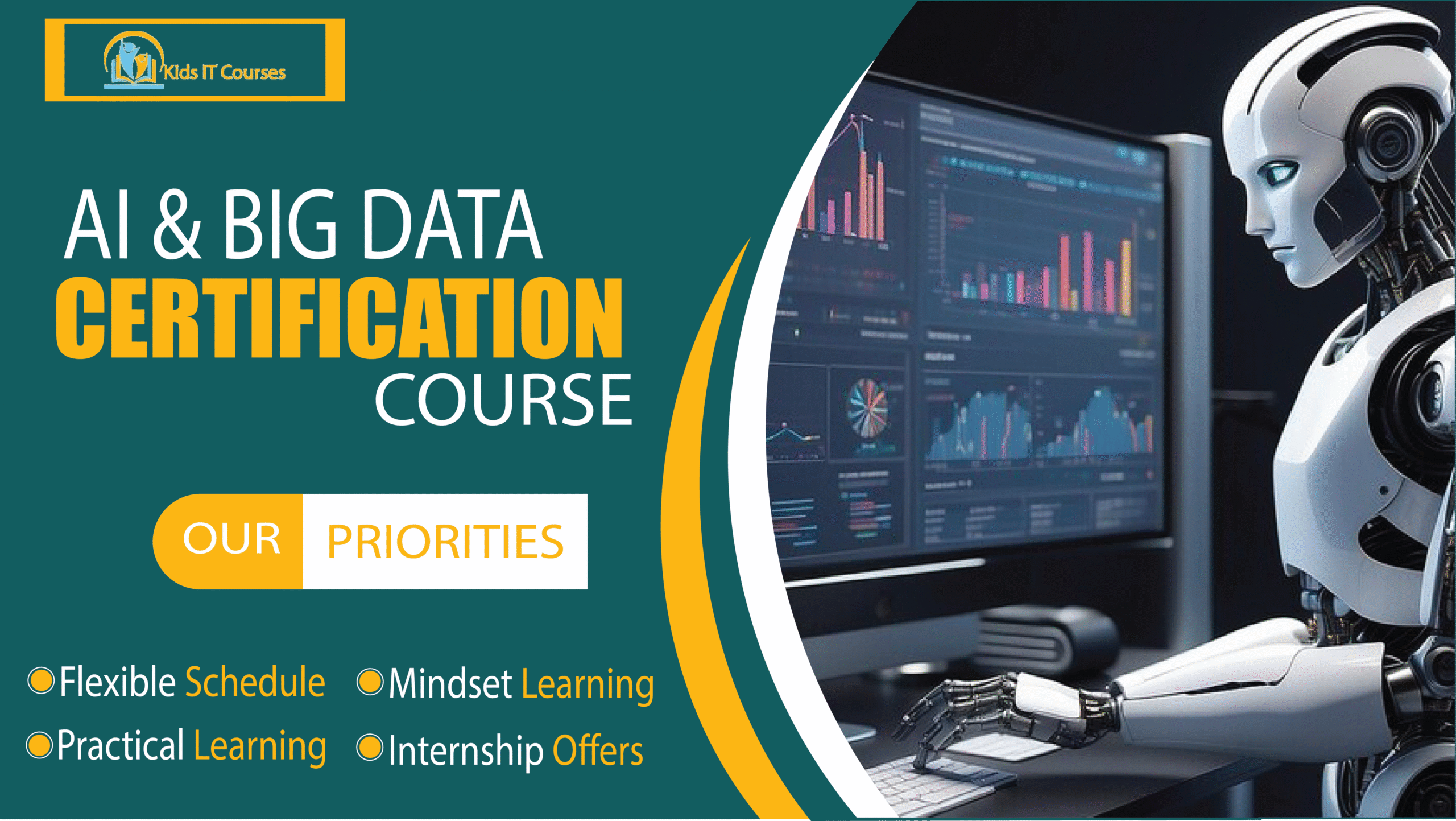
Big Data And AI Course for Kids
Definition
• Kids learn how large amounts of information are collected and used. It’s like finding patterns in a huge box of puzzles.
• They discover how machines can think, learn, and make decisions. It’s like teaching computers to be smart!
• The course helps children think clearly and solve problems step by step. It makes their minds sharper and more organized.
• Kids use data and AI tools to make games, chatbots, or smart apps. Learning becomes playful and exciting.
• They get hands-on practice with simple coding and tech tools. It’s a great start for a future in technology.
• Big data and AI are used in science, business, and everyday life. Learning now gives kids a big head start in tomorrow’s world.
AI And Big Data | Course for Kids Nearby Rawalpindi
Importance
• They learn how to solve problems by using facts and patterns. It helps their brain grow stronger and sharper.
• Kids discover how to read and use large sets of data. This helps them make smart choices in fun ways.
• They explore how robots and smart apps work. It’s like learning the magic behind today’s technology!
• They create fun projects using data and AI tools. This builds both imagination and smart thinking.
• Big Data and AI are used in health, games, space, and more. Learning now gives kids a head start in tomorrow’s world.
Advantages for Big Data & AI
• Kids learn how to solve problems step by step. They get better at thinking clearly and logically.
• They explore fun ways to read and use lots of data. It’s like finding secrets hidden in numbers!
• Kids discover how AI helps apps, robots, and games think. They learn to make simple smart programs themselves.
• They work on fun projects using real tools. Learning by doing makes it easier to remember.
•Big data and AI are used in many cool jobs. Learning now gives them a strong head start!
Session 1 : What is Big Data?
Difference between regular data and big data
Real-life examples: YouTube, weather data, games
Activity: Imagine how much data YouTube gets every hour
Visual: “1,000,000 Lego bricks = Big Data!”
Session 2 : How is Big Data Collected?
Structured vs unstructured data
Devices, apps, sensors, social media
Activity: Create a “data diary” of one day’s digital activities
Session 3 : How Big Data is Processed
- Data centers, cloud computing
- Tools like Google BigQuery (intro concepts)
- Story: “From Chaos to Clarity – The Data Journey”
- Simple visual: funneling raw data into charts
Session 4 : Patterns & Predictions with Data
- How patterns are spotted in big data
Use a spreadsheet to identify trends (games, shopping, weather)
Mini project: Predict the most played game in a week based on data
Session 5 : Intro to Artificial Intelligence
AI vs traditional programming
Use examples: YouTube suggestions, Google Translate
Hands-on: Train a model using Teachable Machine
Session 6 : How Big Data Powers AI
Data is the “fuel” for AI brains
Case study: Self-driving cars need thousands of road images
Activity: Match the right data with AI tasks (images for vision, words for chatbot)
Session 7 : Data Ethics & Digital Responsibility
What is data privacy?
Fairness, bias, and security in AI
Storytime: “The Curious Bot Who Didn’t Understand Fairness”
Build a “Be Fair with Data” kid pledge
Session 8 : Final Project – AI Idea Powered by Big Data
Pick a challenge (e.g., clean air, smart school, game recommendation)
Plan how big data + AI solve it
Present as poster, pitch, or simple digital prototype
Get certified as “Big Data & AI Junior Innovator”
Bonus Materials
Helps kids log, track, and imagine data flow in daily life
Printable templates for data visualization (bar, pie, line)
Fun terms: dataset, pattern, prediction, ethics, cloud, model
Links and steps to use Teachable Machine or QuickDraw for AI experiments
Printable, editable certificate for course completion
